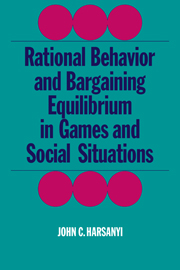5 - Some basic concepts of game theory
Published online by Cambridge University Press: 24 November 2009
Summary
Introduction
The main concern of this book is with game situations (situations of strategic interdependence), in which the outcome depends on mutual interaction between two or more rational individuals, each of them pursuing his own interests (and his own values) against the other individuals, who are likewise pursuing their own interests (and their own values). In earlier chapters we discussed situations of individual independence (certainty, risk, and uncertainty), in which the outcome depends on the actions of only one individual (and possibly on chance). We also discussed moral situations, in which the outcome does depend on interaction between two or more individuals but in which this outcome and these individuals' actions are evaluated, not in terms of their own individual interests but rather in terms of the interests of society as a whole – as seen by an impartial but sympathetic observer. However, all of this was merely a preliminary to our analysis of game situations.
Following von Neumann and Morgenstern [1944] it is customary to analyze what we call game situations by using parlor games – already existing ones or ones specially constructed for this very purpose – as analytical models. (More specifically, what are used as models are games of strategy, where the outcome depends at least in part on a rational choice of strategy by the participants rather than on mere physical skill or on mere chance.) Hence the term “game situations” and the name “game theory”, for the theory analyzing such situations, arise.
Information
- Type
- Chapter
- Information
- Publisher: Cambridge University PressPrint publication year: 1977
